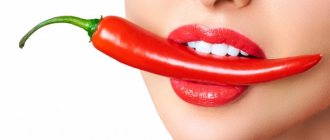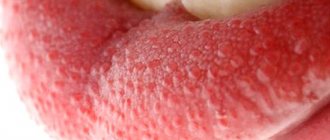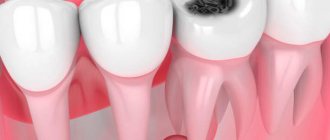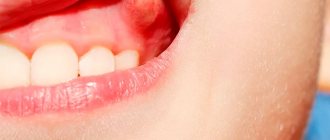Bitterness in the mouth may indicate problems with the digestive system. Severe or persistent bitterness in the mouth is a reason to consult a doctor.
From time to time you may experience an unpleasant bitter taste in your mouth. As a rule, this is due to a sudden release of bile into the gastrointestinal tract. In this case, some bile may enter the esophagus and cause a bitter sensation in the mouth.
. Often a bitter taste in the mouth is felt in the morning, since bile can enter the stomach during sleep (especially if you sleep on your left side and dinner included fatty foods).
Bile is a secretion produced by the liver and is necessary for digesting food. The bile duct carries bile from the liver to the gallbladder, which acts as a storage reservoir. During the active digestive phase, bile from the gallbladder enters the duodenum. Some substances have choleretic properties, that is, they increase the production of bile. Eating foods with choleretic properties (for example, pine nuts) can provoke a sharp increase in the flow of bile into the intestines and, as a result, the appearance of bitterness in the mouth. Some medications have the same effect - both medical preparations and traditional medicine (St. John's wort, sea buckthorn oil, etc.).
However, bitterness in the mouth should not be ignored
. Its appearance indicates that not everything is in order with the digestive system. For example, a bitter taste may appear after eating fatty (heavy) foods. Fatty foods stimulate bile secretion. Normally, the secreted bile should not enter the stomach and esophagus, but should be released exactly as much as is necessary for the digestive process in the intestines. The appearance of bitterness indicates that this is not the case. And we need to figure out what caused this. If bitterness in the mouth occurs frequently or persists for a long time, then it is better not to delay a visit to the doctor.
Causes of bitterness in the mouth
Bitterness in the mouth can be a symptom of various diseases.
Most often it is caused by diseases of the organs responsible for the production and movement of bile in the body, such as chronic cholecystitis
(inflammation of the gallbladder),
cholelithiasis
(in this case, the formation of stones interferes with the proper outflow of bile),
biliary dyskinesia
(impaired motility). Sometimes patients who previously had a bitter taste in the mouth due to cholelithiasis or inflammation of the gallbladder, and who had a cholecystectomy (surgery to remove the gallbladder), are surprised by the return of the symptom. But a bitter taste in the mouth can occur even in the absence of a gallbladder, because bile is still produced and can enter the stomach, and from it into the esophagus. If a person has had their gallbladder removed but has not changed their eating habits, the return of digestive problems and a bitter taste in the mouth is very likely
Bitterness in the mouth can occur with various disorders of the digestive system, for example with chronic gastritis
or
chronic pancreatitis
Liver diseases can lead to changes in the composition of saliva, which may also result in a bitter taste in the mouth.
Another group of reasons for the feeling of bitterness in the mouth is diseases of the oral cavity (stomatitis, inflammation of the tongue). A bitter taste can also be a reaction to dentures if they were chosen incorrectly (the individual intolerance of the material from which they are made was not taken into account).
Sometimes bitterness in the mouth is caused by other reasons: toxicosis (in pregnant women), acute poisoning, cancer.
Diagnostic methods
Only a doctor can determine the cause of the symptoms described above. To make an accurate diagnosis and develop a therapeutic regimen, the doctor may prescribe the following procedures:
- examination of the skin and tongue, palpation of the abdomen;
- blood test for liver tests - ALT, AST, bilirubin;
- FGDS is a diagnostic procedure during which an endoscopist evaluates the functioning of the gastrointestinal tract, identifies foci of inflammation, and takes tissue for histological examination;
- Ultrasound of the abdominal organs - liver, pancreas, gallbladder and spleen;
- blood test for hormones;
- coprogram and general clinical blood test.
Additional symptoms of bitterness in the mouth
Bitterness in the mouth may be accompanied by additional symptoms. If heaviness or pain is felt in the right side, this may indicate liver or gallbladder disease. If bitterness in the mouth is accompanied by nausea, heartburn, and belching, then the cause may be stomach diseases. If the cause is diseases of the oral cavity, then the feeling of bitterness may be accompanied by bad breath.
Treatment
Help before diagnosis
To reduce discomfort during diagnostic procedures, it is necessary to reconsider the diet: switch to frequent small meals, eliminate fatty foods and alcohol. Careful oral hygiene with the help of toothpastes, dental floss, and irrigators is important. Doctors advise stopping smoking or reducing the number of cigarettes smoked per day as much as possible.
If you have a strong bitter taste, you should regularly rinse your mouth with boiled water and lemon juice; at work, you can eat a mint candy or a slice of lemon. The feeling of bitterness helps to reduce the rational drinking regime with consumption of at least 1.5 water per day. If the symptom is accompanied by severe abdominal pain, repeated vomiting or other dyspeptic disorders, you should immediately visit a doctor.
Conservative therapy
Therapeutic measures are selected taking into account the cause of bitterness in the mouth. An important component of therapy is a special diet that improves digestion processes, and physiotherapy techniques are also actively used. The main direction is drug etiotropic and pathogenetic therapy. Most often used:
- Choleretic agents
. Prescribed drugs that improve the colloidal properties of bile (choleretics) and stimulate its excretion through the bile ducts (cholekinetics). Medicines are recommended for cholecystitis and cholangitis to normalize digestive function. - Antispasmodics
. The products relax the smooth muscles of the gastrointestinal tract, relieve pain in the abdomen, which often occurs simultaneously with a bitter taste. Analgesics from the group of non-steroidal anti-inflammatory drugs are indicated for the treatment of inflammatory diseases. - Enzymes
. Combined preparations of pancreatic enzymes and bile acids stimulate digestion, due to which the bitterness in the mouth disappears. For hepatitis and infectious liver lesions, they must be combined with hepatoprotectors. - Antihelminthic drugs.
Recommended for helminthiasis that affects the bile ducts and liver tissue - opisthorchiasis, echinococcosis. To eliminate giardiasis, specific antiparasitic medications are effective. - Antiviral agents
. When treating hepatitis caused by viruses B or C, separate protocols are used that involve the use of inhibitors of the assembly and formation of viral particles. Pegylated interferons are also prescribed.
Prevention
To avoid discomfort, it is recommended, first of all, to make adjustments to your own diet and diet. So, it is better to give up sweets, baked goods, fatty and fried foods, alcohol, as well as products containing large amounts of dyes, preservatives and other synthetic additives. The daily menu should be filled with fiber, cereals, lean fish, meat, vegetable broths - such a diet will restore the “affected” functions of the gastrointestinal tract as soon as possible.
Since a bitter taste in the mouth often “haunts” smokers and those who abuse alcohol, giving up bad habits is also on the list of mandatory preventive measures. The daily fluid intake (pure water, natural juices, fresh compotes, fruit drinks) should be 2–2.5 liters. This will ensure healthy functioning of the digestive tract and have a positive effect on metabolism in general.
To combat nausea and bitterness, patients are prescribed a diet, symptomatic drug treatment, and, if indicated, surgery.
Timely treatment of chronic and acute diseases (primarily infectious lesions of the oral cavity, upper respiratory tract, gastrointestinal tract) will also prevent the occurrence of discomfort. Due to the fact that nausea and bitterness in the mouth can have not only physiological (overeating, pregnancy, intoxication), but also pathological causes (diseases of the liver and other digestive organs, dental problems), if discomfort persists for a long time, you should seek help from a doctor , be examined and undergo appropriate treatment.
Signs and diagnosis
To determine why the patient feels sick and has a bitter taste in the mouth, the doctor must analyze the accompanying manifestations. Their list includes:
Causes of rotten breath
- bloating and stomach pain;
- nausea;
- the appearance of bitterness in the mouth after vomiting;
- problems with stool (diarrhea, constipation);
- digestive disorders (discomfort in such cases occurs after eating);
- dizziness;
- increased gas formation;
- putrid odor from the mouth.
Dryness and bitterness in the mouth + attacks of nausea are “identifying signs” of gastritis (inflammation of the gastric mucosa). If belching is also added to these, we are talking about cholecystitis. The latter is accompanied by periodic spontaneous pain in the epigastrium and right hypochondrium. It is noteworthy that exacerbation of cholecystitis can be triggered by both increased stress or physical activity, and banal overeating.
Important! Any dyspeptic manifestations (nausea, vomiting, diarrhea, bitter taste on the oral mucosa, abdominal pain) in most clinical cases are aggravated by malfunctions of the hepatobiliary system (liver, biliary tract, gallbladder) and other gastrointestinal organs.
Thus, patients with such symptoms begin to have difficulty with “heavy” meals, lose their appetite, and may lose weight. Liver disorders can be “recognized” by the characteristic jaundice of the skin and mucous membranes - in combination with dyspepsia, jaundice indicates hepatitis, cirrhosis, hepatosis and other serious pathologies. Bitterness and nausea after eating are a sign of the following digestive disorders: gastroduodenitis, problems with intestinal motility (spasmodic nature), colitis, enterocolitis.
Diagnosis for persistent bitterness and nausea includes:
- examination, analysis of patient complaints, history taking;
- palpation of the epigastrium, right hypochondrium, gallbladder;
- fibrogastroduodenoendoscopy (instrumental examination of the esophagus, duodenum and stomach);
- general, clinical analysis of blood, urine;
- ultrasound of the abdominal organs;
- if hepatitis is suspected, liver tests;
- pH-metry (allows you to determine the level of stomach acidity);
- for diseases of the oral cavity - a dental examination.
Solution
Treatment of bitterness, nausea and other associated symptoms depends on the cause of their occurrence. It happens that it is enough to adjust the diet, not overload the digestive organs and establish a drinking regime, and the discomfort disappears by itself.
Diagnosis of the causes of nausea and bitterness in the mouth involves taking a medical history, analyzing complaints and examining the patient, as well as a whole range of instrumental and laboratory tests
For diseases of the pancreas, intestines, and duodenum, patients are prescribed the following medications:
- Pancreatin (enzymatic drug, has a positive effect on digestive function);
- Furazolidone (antibacterial tablets, taken after meals, normalize the state of intestinal microflora);
- Omeprozole is recommended for ulcerative lesions of the duodenum and stomach;
- the medicinal group of hepatoprotectors allows you to prevent further pathological changes in liver cells and restore already “damaged” hepatocytes.
Enterosorbents (drugs that bind and remove toxins from the body), as well as probiotics (“useful” intestinal bacteria) are integral components of drug therapy for bitterness in the mouth and attacks of nausea. For dyskinesia and other problems with the gallbladder or liver diseases, it is useful to take choleretic herbal teas (sold in pharmacies).
Important! In some clinical cases (for example, with cholelithiasis), patients with nausea, bitterness in the mouth, and abdominal pain may require surgical intervention.
Where does the bitter taste come from?
An unpleasant taste may be present constantly or appear periodically. This symptom is associated with the release of bile into the esophagus. Patients often notice a bitter taste in the mouth in the morning, especially when eating fatty foods the day before and after sleeping on the left side.
Bile is a liver secretion that is involved in digestion. The fluid flows through the ducts into the gallbladder and from there into the duodenum. Normally, bile does not flow into the esophagus, and the person feels well.
After eating certain types of food, the liver may react by producing more secretions. The volume of bile in the intestines increases, and a small part enters the esophagus, causing a bitter taste in the mouth. The same reaction occurs when using certain medications or when exposed to other factors. In any case, an unpleasant taste is a reason to consult a doctor. Only by identifying the cause of bitterness in the mouth can a person’s well-being be improved.
Expert advice
When there is bitterness in the mouth, self-medication is the most dangerous. It is believed that the main cause of the symptom is liver disease. Patients begin to make compresses on their own and drink herbal decoctions. Instead of relief, complications occur. The patient is sent to the hospital with severe pain, intoxication, peritonitis, etc. These are the consequences of trying to make an independent diagnosis. It turns out that the cause of the bitterness in the mouth was gallstones. A person independently drinks choleretic decoctions, stimulates the migration of stones, which safely get stuck in the duct and cause an acute attack. Instead of having the crystals crushed under medical supervision, the patient goes straight to the operating table.
Dzhgarkava Tea Gochaevna
Therapist-cardiologist Experience 5 years
There are other, no less dangerous cases. To get rid of bitterness in your mouth, you need to go to the doctor and cure the detected diseases. This is the only right decision.
Diagnostics
You can start diagnosing with a consultation and examination with a doctor. To do this, you need to contact a therapist, gastroenterologist, hepatologist or dentist. The doctor will conduct a survey and refer the patient for examination.
Photo: okfoto / freepik.com
During the consultation, the doctor needs to describe in detail the existing symptoms, tell how often and under what circumstances bitterness appears. Information about lifestyle, diet, and existing diseases will be useful.
For diagnosis, the following studies are carried out:
- Duodenal sounding. If a malfunction of the biliary tract is suspected, portions of bile are taken using a probe for bacteriological examination, and the rate of excretion of bile into the duodenum is also assessed.
- Gastroscopy (EGDS, FGDS) is a study using a gastroscope. Allows you to examine the mucous membrane of the digestive organs and do a biopsy (take tissue samples for laboratory testing).
- Ultrasound of the liver, gall bladder and other organs. It is carried out to assess the size and presence of changes in internal organs.
- Lab tests. If diseases of the digestive organs or biliary tract are suspected, a stool test is prescribed. A biochemical blood test is performed if cholecystitis is suspected. A test for hCG and sex hormones, as well as a serological test if viral hepatitis is suspected, can also be performed.
Common Causes
Bitterness in the mouth often occurs in patients over 40 years of age, especially in the morning. If the condition remains constant, the patient should seek advice from the local clinic. Sources of unpleasant sensations are presented:
- Low quality food – poor preparation, burnt marks affect the aftertaste. It lasts for about half an hour and decreases after drinking water. The taste may be caused by stale nuts or seeds due to the breakdown of the fatty acids they contain.
- With age – over the years, changes occur in the mucous membranes of the oral cavity, and the ability to distinguish taste is impaired. In this case, any food becomes bitter - due to a reduced amount of saliva and the active proliferation of pathogenic microorganisms.
- Nicotine addiction - combustion products settle on the mucous membranes of the oral cavity. If a secondary metallic taste occurs, the patient should urgently seek medical help.
- Pregnancy - hormonal imbalances change the process of bile movement. The first quarter of gestation can cause discomfort due to persistent toxicosis and regular vomiting. The deviation that appears at the end indicates the development of cholestasis, accompanied by itching, darkening of urine and lightening of stool.
- Functional dyspepsia - slow digestion of food and weakened intestinal motility, provokes bitterness in the mouth immediately after eating. The pathology is accompanied by a feeling of heaviness, increased formation of gases.
- Hepatitis - liver damage of various etiologies is characterized by the same symptoms. Along with the bitter taste, discomfort occurs in the area of the right hypochondrium, and attacks of vomiting mixed with bile.
- Diseases of the biliary organs - uncontrolled secretion production leads to an aftertaste after fatty and fried foods, alcoholic drinks. Along with these symptoms, the pathology is accompanied by dull pain and frequent bowel movements. Complex forms of the disease lead to changes in the color of the stool to whitish and constant itching.
- Pathologies of the gastrointestinal tract - the chronic course of gastroduodenitis is accompanied by bitterness in case of violations of the recommended dietary table or against the background of stable nervous tension.
- Diseases of the pancreas - the main symptom is added to the aroma of rotten breath. Exacerbation of the pathology leads to vomiting with food debris and bile. The patient's tongue becomes covered with a grayish or yellowish coating.
- Dental problems – ulcers on the oral mucosa, stomatitis and caries cause discomfort. Sometimes the source of the problem is the installation of cheap fillings, which are destroyed under the influence of salivary secretions, or prosthetics.
Bitterness in the mouth can be caused by taking certain medications. In rare cases, the pathological condition is accompanied by neurological problems that provoke a change in taste perception.
What to do if you have a bitter taste in your mouth and a white coating on your tongue
Some medications cause a bitter taste. These include lithium preparations, antidepressants, antibiotics, allopurinol, vitamin and mineral complexes. Bitterness in the mouth can be combined with nausea, dryness, and a white coating on the tongue. Usually, special treatment for bitterness in the mouth after taking antibiotics or other medications is not required. The unpleasant taste disappears upon completion of the course of treatment and no longer bothers you.
What should you do if you have a bitter taste in your mouth and a white coating on your tongue that persists for a long time after taking medications? Contact your doctor. It may be necessary to prescribe hepatoprotectors - drugs that restore liver function. The treatment regimen for some diseases initially includes medications that “protect” the liver. This approach is practiced when prescribing chemotherapy drugs, especially with long courses and high dosages.
Help before diagnosis
Even if a diagnosis has not yet been made, several measures can be taken to alleviate the condition:
- Adjust your diet, remove fatty and fried foods, eat more often and in small portions.
- Stop smoking or reduce the number of cigarettes you smoke.
- Limit alcohol consumption.
- Drink more water.
Monitor the quality of oral hygiene. You should brush your teeth twice a day, as well as use mouthwash and floss. If you have problems with your teeth, you need to visit a dentist.
Photo: goffkein/freepik.com
Important! You should not try to use folk remedies or treat yourself - this can be dangerous. If a bitter taste in your mouth appears regularly, you should consult a doctor and get recommendations for treatment.
Clinical symptoms
Impaired sense of taste is associated with a large number of diseases. Depending on the type of pathological process occurring, the patient may experience many associated symptoms:
- state of lethargy and weakness;
- a grayish or whitish coating forms on the tongue;
- pain and discomfort affect the area of the right hypochondrium or the iliac region;
- frequent belching with the smell of consumed food, air;
- feeling of stale breath, feeling of heaviness on the side;
- change in the standard color of the skin and whites of the eyes to yellowish shades;
- slowdown of metabolic processes with hair loss;
- constipation, diarrhea and other intestinal disorders.
If the source of the unpleasant taste is the formation of stones in the cavity of the gallbladder, then the clinical picture is complemented by painful sensations due to their movement.








